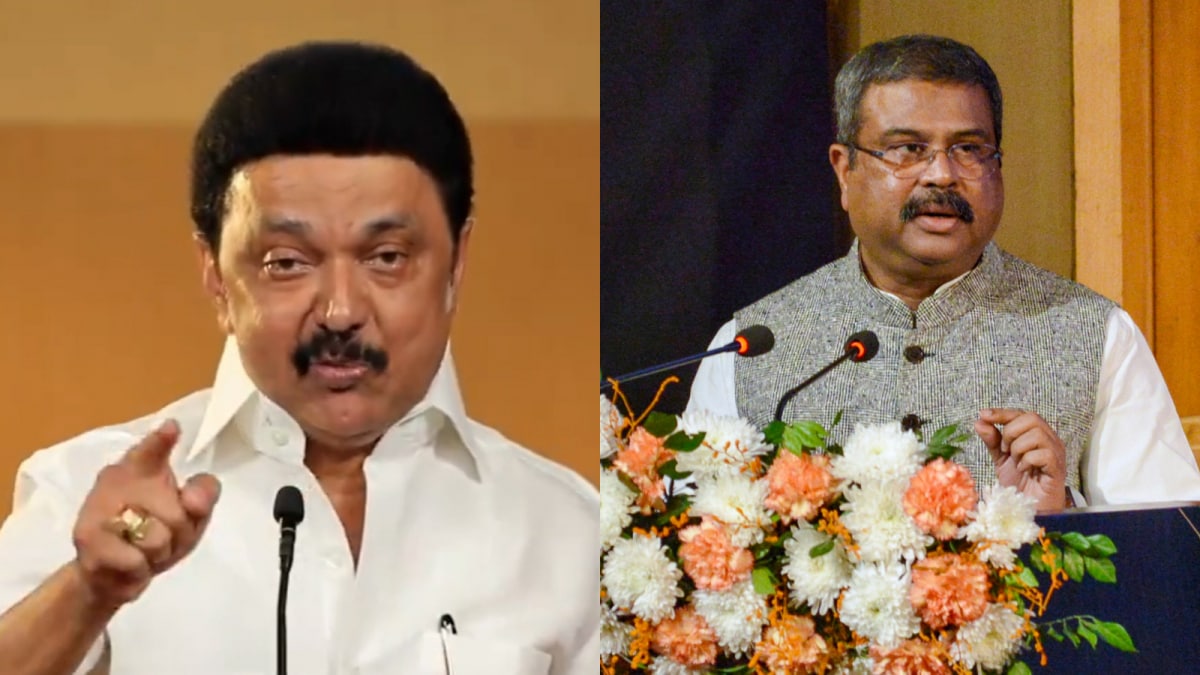Last Updated:
Tamil Nadu CM MK Stalin and Union Education Minister Dharmendra Pradhan have yet again clashed over NEP 2020. Stalin has accused the Centre of withholding funds to “force” acceptance of central schemes.
Tamil Nadu CM MK Stalin and Union Education Minister Dharmendra Pradhan have been at loggerheads. (Image: PTI)
Tamil Nadu Chief Minister MK Stalin and Union Education Minister Dharmendra Pradhan have been engaged in a war of words yet again, barely four months after they sparred over accepting provisions of the National Education Policy (NEP), 2020. The issue remains the same with accusations only getting intensified. This time, the TN CM said that the Centre cannot “blackmail” them into accepting central schemes like PM-SHRI and the three-language formula, envisaged under the NEP, by holding back Samagra Shiksha Abhiyan (SSA) funds
Tamil Nadu is one of the several Opposition-ruled states that have been opposed to the NEP. The state’s education minister has claimed that TN is yet to receive funds to the tune of Rs 2,400 crore due to it under the SSA for 2024-25 as well as the last tranche of Rs 249 crore under the programme for 2023-24. The TN governor, too, had raised the issue in the state assembly this January urging the Centre to release funds under SSA, a delay in which will impact the future of over 40 lakh students and 2.2 lakh teachers.
After Delhi, Punjab, WB, SSA funds now being held up for TN
Last July, the Centre had stopped disbursement of SSA funds to three Opposition-ruled states – Delhi (then ruled by the AAP), Punjab and West Bengal (WB) – for outrightly refusing to implement the PM-SHRI (PM Schools for Rising India) scheme. States had to sign a Memorandum of Understanding (MoU) to comply with the scheme.
However, these three states had refused to sign the MoU following which funds under SSA were stopped to these states for around three quarters. It was only around October last year that Delhi and Punjab, facing fund-crunch, agreed to sign the MoU to finally implement the scheme. The AAP was defeated from power in the Delhi government in the recently held Delhi Assembly elections by the BJP.
Besides these three states, Kerala and Tamil Nadu, too, had refused to sign the MoU initially. Later on, however, the two southern states had indicated that they are willing to implement the scheme, but TN is yet to do the same.
Last year, TN had proposed to the Education Ministry that while it was ready to implement PM-SHRI, the prefix ‘PM’ be removed from the MoU, which was turned down by the former. Tamil Nadu had also proposed that the Centre releases the funds to it barring the amount allocated for PM-SHRI. This, too, was turned down by the Centre saying that since funds under SSA are for entire funding for school education, of which PM-Shri is a part, the state cannot receive the funds unless they implement all objectives under the scheme.
The war of words
TN CM Stalin on Sunday took to X (formerly Twitter) to share a video clip of Pradhan speaking to reporters at the Kashi-Tamil Sangamam in Varanasi, quoting him as saying that Tamil Nadu must adhere to the Indian Constitution and the three-language policy, which is now the rule of law. He also slammed the latter for saying that the state will not get funds until the policy is accepted.
“Can the Education Minister specify which provision of the Indian Constitution mandates the three-language policy? India is a Union of States. Education falls under the concurrent list. The Union government is not an absolute master in this matter. The audacity to blackmail Tamil Nadu by saying, ‘No funds until the three-language policy is accepted,’ will not be tolerated by Tamilians,” TN CM posted.
Responding to it, Pradhan, while speaking to the press on Monday on the sidelines of an event, said: “Three-Language Policy is applied in the regulatory process of our country, in many states, particularly in education. When NEP 2020 was implemented in the country, it clearly stated that the 3-Language Policy should be adopted in the country. The reason being that considering the current social and economic conditions, the country requires a system where anyone from any region can find employment. This necessity, keeping in mind the social, cultural, and economic needs of the country, has been emphasised by experts, and they suggest that the trilingual formula for education is a useful system.”
Pradhan also said that he agreed education is a subject in the concurrent list, “but to create competition among students, to create a level-playing field, we have to come to a common platform. There is no imposition of Hindi or any other language on them. We are committed to implementing NEP and there are certain conditions for the same.”
SSA and PM-SHRI
PM-SHRI scheme was announced in the Union Budget 2022, seeking to develop 14,500 PM-SHRI schools across India, which will showcase each of the objectives envisaged in the NEP, 2020 and provide leadership to other schools in the district.
SSA is the flagship school education programme to implement the Right to Education (RTE), Act 2009. The Centre is supposed to fund 60 per cent of the scheme while states have to bear 40 per cent of the expenses, except for the northeastern states and Union Territories (without a legislature), which have a larger share of central funding. SSA includes funding for teachers’ and staff salaries besides other major expenses for school activities.
Since SSA was designed in 2018 by the ruling BJP government and the NEP was developed in 2020, the former was aligned with the NEP in 2021. A draft regarding this was sent to all states, and according to education ministry officials, none of the states raised any objection to it then. In 2022, the PM-SHRI scheme was announced and incorporated under the SSA. States are required to confirm their participation in PM-SHRI by signing an MoU with the education ministry.





